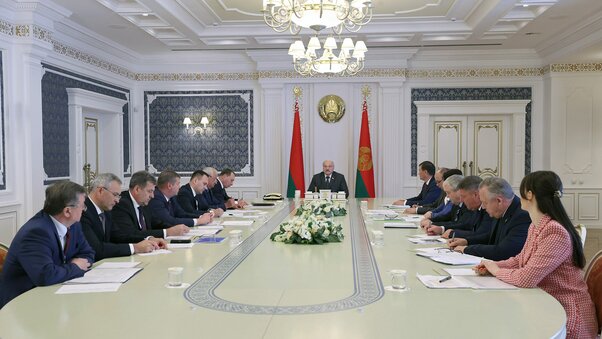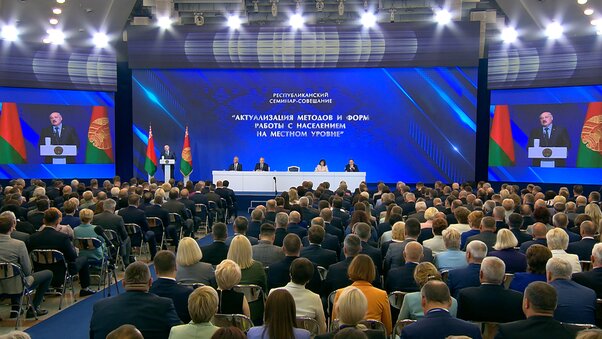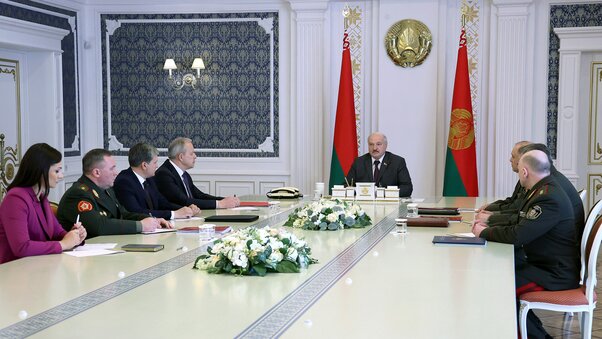Meeting to discuss development of microelectronic industry in Belarus
- 17
- 2
Amid the current hybrid confrontation, giving a new impetus to the development of the microelectronic industry becomes as relevant as ever, Belarusian President Aleksandr Lukashenko said at a government session to discuss the development of the microelectronic industry in the country on 14 June.
“Even our scientists saw that the so-called market freedom had reduced to an empty sound. There is no market freedom, no market at all. Everyone promotes their interests, protects their interests as much as possible. Political pressure and trade wars have turned into a hybrid confrontation. Every day we have to fight for sovereignty and security of the country. Simultaneously we have to build up our competences because we can only fully rely on ourselves and on friendly countries such as Russia. Given all this, it is very important that we provide a new impetus to the development of the microelectronic industry,” said the Belarusian leader. According to him, both Belarusians and those who systematically build barriers for purchasing electronic components from abroad understand that.
According to the President, both science and production in certain areas have become tightly integrated in today's global world. Aleksandr Lukashenko is convinced that Belarus should speed up in order to catch up with the leading countries, or at least to produce critically important products at home and not to depend on imports.
The head of state said that before the collapse of the Soviet Union microelectronics made in Belarus were comparable in functionality and reliability to the products of the companies that dominate the global market today. “Even today, Belarus has not lost its leading position in the world in a number of high-tech areas. However, we are seriously lagging behind in a number of others. That is a fact. Our enterprises and developers offer complex solutions with high saturation of microelectronic components in space optics, radiography, nondestructive control, and Earth's atmosphere sensing. The list can go on,” the President said.
Belarus is quite strong in optical (laser) physics, Aleksandr Lukashenko added.
“The domestic potential is clearly illustrated, first of all, by the achievements of the military-industrial complex. Belarusian radar systems for various purposes are capable of giving precise targeting on any, even the most advanced means of attack, in any weather and at any altitude,” the head of state said. According to him, Belarus is one of the world leaders in electronic warfare. Belarus has also achieved considerable progress in the production of smart unmanned vehicles.
“Our developments are capable of surprising and, most importantly, bringing back to their senses those people who are hatching aggressive plans against Belarus and Russia, the Union State as a whole. However, even in the defense sector we are still dependent on foreign components, especially those that we will never produce in Belarus because we need them in small quantities and only an idiot would spend billions of dollars to build huge factories to produce such components. It just does not make economic sense,” Aleksandr Lukashenko said.
In the current conditions, it is advisable to try to reduce dependence on imports whenever possible, the head of state believes.
“National data centers, bank transaction processing centers, and public security monitoring tools should work on the basis of their own solutions. Belarus has human as well as scientific potential. This is the most important thing. Now it is necessary to concentrate all efforts on strategic tasks,” the President said.
Some steps in this direction have already been made, said Aleksandr Lukashenko. The leading structures with competences have formed the Micro-, Opto-, and Microwave Electronics cluster at the National Academy of Sciences of Belarus.
“A draft concept has been worked out for research and development in our country to promote an export-oriented and import-substituting electronic component base. The government supports this initiative. It is good, but we must not close ourselves within national borders. It will not bring the desired effect,” he added.
The head of state stressed that the country needs to cooperate not only with the countries which are willing to do it, for example, Russia, but also with others such as the United States, Japan and so on. “We need it to see the highest level we aspire to achieve,” he said.
“We must work, of course, in close cooperation with Russia. We do not hide our interest in this regard. All the developments that we have (scientific, experimental and design) can be realized only thanks to timely financing. Russia is ready to finance us in this regard. President Putin and I have talked about this many times and have come to this agreement,” the President said. The Belarusian head of state noted that Russian Deputy Prime Minister Yuri Borisov has been put in charge of this matter.
“The interest is enormous,” the head of state continued. “Today, no one needs to be convinced of the need for close cooperation, as was the case before in power engineering, agricultural machinery and automotive components.”
Aleksandr Lukashenko suggested setting up a Belarusian-Russian body to coordinate joint work. A proposal has been once made to set up a Belarusian-Russian ministry. “If we create some kind of structure that will be above our ministries, this will not solve the problem. This will only entail money expenditures. Therefore, we need to seriously think about the way to coordinate our work and who will deal with it," the President added.
Speaking about the importance of the meeting on the development of microelectronics, the head of state drew attention to an extended number of its participants, including the industry minister and the chairman of the Presidium of the National Academy of Sciences. “I expect from the participants of the meeting an objective report on the state of affairs in the microelectronics industry. And also on how the interaction between the Belarusian and Russian agencies is organized,” he said.
Summing up everything he said, the President added a simple formulation: rockets and airplanes must continue flying despite any external pressure or sanctions.
“I want to hear about the progress made in import substitution in the face of these frantic, illegal sanctions. What can we do, how quickly, what solutions and resources are required? I ask you to consider one thing: now is a time of opportunities for the microelectronics industry, as well as for other industries. Frankly speaking: our products and services are very much in demand. They are in demand primarily in our fraternal Russia. In Belarus you produce everything, albeit a little but enough to meet the needs of the Belarusian market (for example, for vehicles, tractors, etc.)," Aleksandr Lukashenko emphasized. “Russia allocates huge funding for these purposes. Keep working. Put this money to good use and produce a competitive commodity.”
Industry Minister Piotr Parkhomchik reported at the meeting on how cooperation with Russia in microelectronics was expanding. A program of joint actions in microelectronics development was approved last December. In April 2022 a memorandum of understanding was signed between the industry ministries of the two countries. A draft intergovernmental agreement in the relevant area has been sent to Russia for approval. The parties are expected to sign it by 1 July 2022.
According to the industry minister emphasized that the Belarusian microelectronics industry is export-oriented, which accounts for 90% of the revenues of the Integral and Planar holding companies. According to him, this year Integral exports are expected to amount to $115 million, up 30% year-on-year. The main consumers of Belarusian microelectronics products on the Russian market are enterprises of the Roscosmos, Rosatom and the Ministry of Defense.
“This means that the most advanced industries and enterprises of Russia need cooperation with our enterprises,” the President said.
Before the meeting, the head of state spent almost an hour studying an exhibition at the Palace of Independence. The display featured the latest and most promising samples of microelectronic products from domestic enterprises.
Integral is one of the largest companies in the country. “Tell me straight. This is not the first time I am addressing this topic. I have an impression that you did not do what you promised. I remember we invested a lot of money in Integral. Then you did not do what you promised. That is my impression,” the head of state said to the director general Vitaly Solodukha.
According to Aleksandr Lukashenko, the company still lags behind the world's highest level. “Maybe we do not need to reach that level for our economy, which is there, in the United States, Korea, Japan. Given the situation, however, we have now decided with Putin that we are going to unite. We are looking for a way out of this situation. Missiles must fly into space, missiles for defense, air defense, ground-to-ground, and so on, submarines and nuclear warheads must fly. Now the most important issue is whether we can provide for our needs - those of Russia and Belarus - with the help of the whole complex of our enterprises (microelectronic enterprises). There is money for that,” the President said.
Products of other enterprises, including Planar and Peleng, and organizations of the National Academy of Sciences of Belarus were also on display. These are developments for space and a wide range of equipment. Many of them compare favorably with their more expensive foreign analogues in terms of parameters and functionality. For example, national scientists are actively mastering cultivation of nitride heterostructures. This areas is becoming more and more popular in the world. While the currently widespread silicon microelectronics can withstand up to 400 degrees Celsius, such modern structures can withstand up to 800 degrees. There are other advantages to this technology. It is the basis for microcircuits, sensors, and even miniature semiconductor lasers.
Aleksandr Lukashenko emphasized such an important aspect as full-cycle production, including equipment and software for it. This is the direction the President would like the Hi-Tech Park to move forward more actively. “You [the scientific and industrial organizations presented at the exposition ahead of the meeting] have a finished product, which we want them [Hi-Tech Park] to have too. IT companies are lagging behind you in this respect. Well, they do whatever the parent company tells them to do. We however need a finished product,” the President said.
The President made it clear that there was no need to belittle anyone and that he was not going to close anyone, the Hi-Tech Park in particular: “They say the President will close something and so on. The period when they were making software for other companies (some small line of business) is over. We need a finished product like this. We need to produce our own software. That is why I say that the Hi-Tech Park needs to do this. I do not want them to be there as lackeys.”
Aleksandr Lukashenko reiterated the importance of developing cooperation with Russia. “Import substitution is the number one issue for us together with Russia, as well as with anyone else who deals with this topic. We need to make use of it and be useful for Russia and Belarus in the first place,” the Belarusian leader said.
The President noted that Belarus should not refuse cooperation in microelectronics with other countries so that it could see the level of their work and keep abreast. Therefore, another important focus should be on training personnel able to efficiently promote this sector in Belarus.


